The Czech Republic will use more fossil fuels as a power source over the next decade than the majority of the EU, a new report has revealed.
Think Tank Ember has analysed energy plans submitted by all 27 European Union member states. These documents, which were submitted to the European Commission for approval, detailed how the country expected to produce electricity by 2030. The Czech Republic submitted theirs in January 2020 after the material was approved by the government. The results don’t look good – Poland is the only country that uses more coal than Czechia.
In 2030, coal, the fossil fuel which emits the most CO 2, will still account for at least a third of total electricity production in Bulgaria, Czechia and Poland (considerably more in Poland).
The 2020’s is a crucial time for climate change action. To meet the EU’s commitments under the Paris Agreement — which aims to limit global temperature rise to 1.5°C — all EU countries need to phase out coal by 2030. However, the report shows that Czechia is far from achieving these goals. Approximately 90% of the remaining electricity generation from coal is expected to be from just three countries, Germany, Poland, and the Czech Republic.
Czechia also has the worst green energy commitment. The country plans to convert less than 5% of its power output to solar and wind by 2030. Meanwhile, the Netherlands plans to replace over 60% of its current electricity supply.
Eastern Europe generally performs below average. Czech Republic, Poland, Slovakia, Hungary, and Bulgaria produced the least amount of bioenergy in 2018, and this trend is set to continue. The use of renewables is slowing down in Czechia, Romania, and Bulgaria despite the cost of solar and wind energy falling over recent years.
In light of this damming report, Czechia’s Minister of Industry and Trade, Karel Havlíček, hit back, telling Deník N that the Czech plan is, on the contrary, ambitious.
The Czech gastronomic scene is going through a challenging period. The only way restaurants can stay up and running now is through a serving window or food delivery.
However, according to some restaurants, delivery services do not offer the fairest conditions. Storyous – which focuses of developing technologies for the restaurant industry – wants to change this, by cooperating with renowned chef, TV personality and entrepreneur, Zdeněk Pohlreich, and taxi ordering app Liftago.
Together, they launched OneMenu.cz, which, according to its founders, is “based on fairness towards customers, carriers, and restaurants”.
According to statistics from Storyous, only about half of Czech restaurants are currently open, and sales in gastronomy fell by 49 per cent year-on-year in October.
“OneMenu.cz has been operating since spring as an online service to order from the dispensing window. Thanks to growing demand from many restaurants, we are now also expanding the service with delivery options, and I am very pleased that Zdeněk Pohlreich and Liftago decided to further develop the project with us,” says Igor Třeslín, Head of Storyous.
From the customer’s point of view, OneMenu works in the same way as the main competing DameJidlo, Wolt or Bolt Food. However, Storyous charges a margin of 3.79 per cent for each order, and the price of the delivery itself then depends on the decision of the restaurant.
For consumers, the service will work similarly to existing food delivery services. Customers will choose a restaurant on the OneMenu.cz website, put their order in the shopping basket, enter the delivery address, and pay on-line. Restaurants can also add a link to the service directly on their websites. However, the main difference is in the relationship between the service, the delivery company, and the restaurant.
“The restaurant sets the price the customer pays for home delivery. The price charged by Liftago to the restaurant is fixed, and thus does not increase with the price of the total order,” explains Ondřej Krátký, founder and CEO of Liftago.
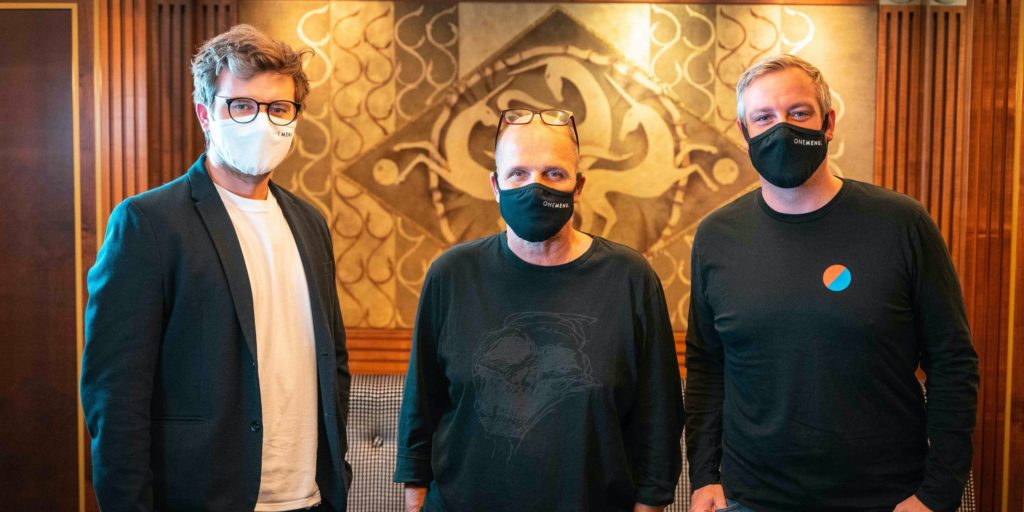
Ondřej Krátký (Liftago), Zdeněk Pohlreich and Igor Třeslín (Storyous)
“For the restaurant, the delivery price with Liftago is fixed, so it does not increase for restaurants with the value of the total order,” adds Krátký. For existing delivery services, the standard model is to take a commission from the overall price of food of up to several tens of per cent, while transport costs of tens of crowns are paid by the customer.
“Unfortunately, we will not announce a specific amount, but we have set it fairly and exactly the same for everyone. It works in two tariffs according to the distance. Delivery up to four kilometres is therefore slightly cheaper than over four kilometres,” specifies Třeslín.
OneMenu currently accepts online orders from over 400 restaurants, which until now had the opportunity to use their own delivery, or delivery with companies other than Liftago.
“The first priority for restaurants now is to survive this crisis. In the current conditions, however, due to the margin of delivery services, our survival would have to be at the expense of the quality of the raw materials from which we prepare food. And this way of survival does not suit anyone. Restaurants want to cook good food and customers want to eat quality food. This is possible with OneMenu.cz, which is now the best choice for all of us. It’s not free, but it’s fair,” says Zdeněk Pohlreich.
Restaurants can connect their businesses to OneMenu.cz after contacting Storyous. Users can already now place their first fair home delivery orders via OneMenu.cz.
From January to September, the number of tourists in Prague fell by almost seventy per cent compared to the same period last year. However, the share of Czech tourists doubled during the first three quarters of 2020.
Thanks to Prague Unlocked campaign, almost 70,000 people visited the metropolis this summer, mainly from the Czech Republic, Germany, Austria, and Slovakia.
More than 400 accommodation facilities participated in the program. Visitors can use free tickets to almost 80 tourist attractions, such as museums, galleries, and monuments.
“Most visitors were families with children, they slept on average two or three nights in four-star hotels. The most popular destinations were the Prague Zoo, Prague Castle, Petrin Tower,” said Hana Třeštíková, Prague Councillor for Culture and Tourism.
“The program has been evaluated very positively not only by us but also by the Association of Hotels and Restaurants or the Confederation of Trade and Tourism,” said Klára Malá, a spokesperson for Prague City Tourism.
“During this summer, Prague recorded a 16 per cent increase in domestic visitors compared to 2019,” she added.
According to the Czech Statistical Office (CSO), less than 750,000 tourists visited Prague during the third quarter of the year, i.e from July to September.
Several hotels may shut down
The municipality extended the campaign until the end of the year. However, due to current government measures against the spread of coronavirus, vouchers cannot yet be used. So the question of whether hotels and museums will open at all by the end of the year is plaguing many business owners.
“It is possible that in December part of the measure will be relaxed and we will be able to attract more people to Prague,” added Třeštíková.
“The current situation is deplorable. At least 450 of the accommodation facilities in Prague are closed,” explains Viliam Sivek, President of the Czech Tourism Union, who is also the owner of Sivek Hotels. “Of the five hotels, three are closed. We have one or two rooms occupied,” says Sivek.
According to Radka Telyčková from the Helping Hoteliers project, many hotels will not be able to cope with the decline in tourism and will not reopen.
Stop mass tourism
For Prague’s mayor Zdenek Hrib the key lies in regulating accommodation for tourists. “We must tackle the Airbnb problem first, otherwise we have no control over how many tourists come to Prague,” he says.
Hrib has submitted a draft law to the Czech parliament that would allow him to restrict rentals via platforms like Airbnb. Entire apartments will no longer be allowed to be rented out at all, but only rooms in apartments where the owner themselves live.
Allegedly, barely 80% of the over 13,000 apartments which Airbnb offers in Prague, are no longer allowed to be offered via the Internet portal. The measure might eventually make renting Prague apartments to locals more lucrative than short-term rentals to foreign tourists.
Czech sculptor Jaroslav Róna is installing a new work in Pankrác – a ten-metre giraffe cast in bronze. But it’s pretty different to anything you’d find in the wild, to say the least.
Rona was inspired by Pokémon, a Japanese anime television cartoon series that premiered in Japan on April 1, 1997. He worked on it for over four years.
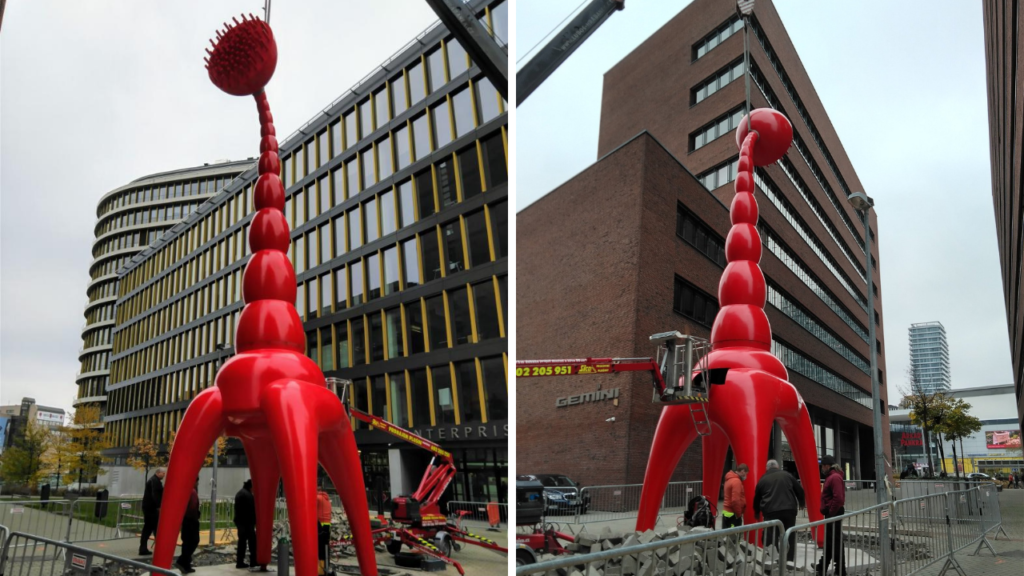
About the author
Born in Prague on 27 January 1957, Jaroslav Róna is a sculptor, painter, and performer belonging to the postmodern generation of the 1980s which has experienced a period of communism, including its fall and transition to democracy. He was a member of the Tvrdohlaví (The Stubborn), a significant art group that participated in activities leading to the liberation of the art scene from socialist demagogy. He has also worked as a theatre and film designer and participated in architectural work.
The main focus of his work is creating sculptures for public spaces as well as painting. From 2005 to 2012 he taught the art of sculpture at the Academy of Fine Arts in Prague. His most famous sculptures include The Franz Kafka Monument in Prague for which he received the Grand Prix of the Society of Czech Architects; the equestrian statue of Jošt of Luxembourg in Brno, the Mythical Ship in Bratislava; and the Child from Mars on Mount Ještěd.
Since 1985 he has exhibited in Bohemia and after 1989 he took his work further afield. He has illustrated several books, including 1984 by George Orwell and The Citadel by Saint-Exupéry. He has published two books of his drawings and texts.

Franz Kafka by Jaroslav Rona
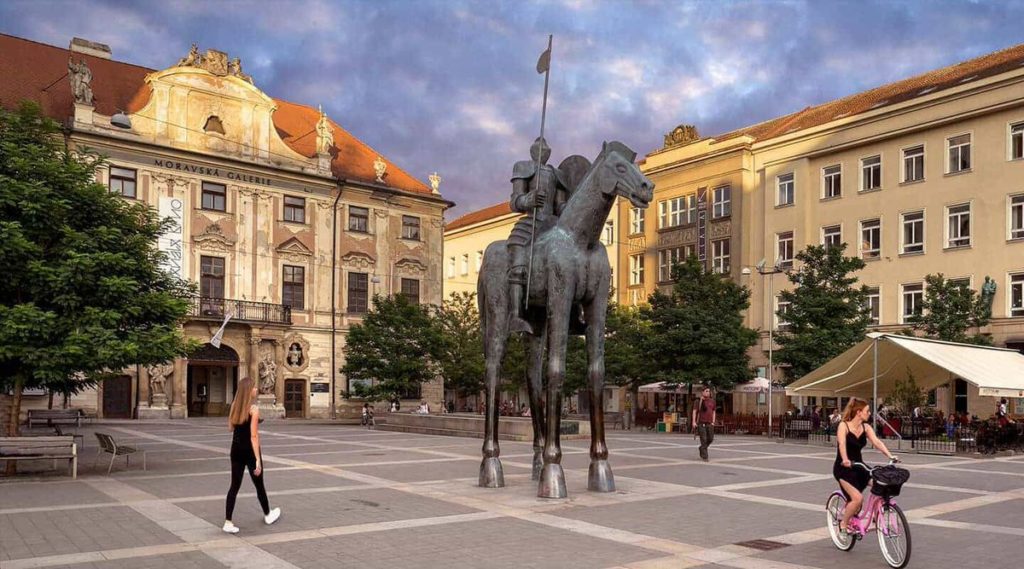
Jošt of Luxembourg, Brno
La Putyka Circus is opening a new “cultural window”, where they will perform short pieces for just one or two lucky spectators.
Found next to the Jatka78 cultural space in Prague 7, this non-traditional theatre project will take place on November 10 from 18:00 to 20:00 in the Skleněnka hall.
Through a ‘dispensing window’, similar to that of some restaurants offering takeaway, viewers will be able to watch a short performance taking place inside. Entry is free but limited, open to individuals, pairs or as a family of four or more.
“In recent days, there have been many talks of theatres staying closed until the end of the year. That’s why we’ve been looking for different ways to stay close to the audience. How to keep a healthy mind and body in shape. How to return the members of the ensemble to a common stage, even for one spectator,” explained director Rosťa Novák Jr.
The performance lasts five minutes and the ensemble will play it ten times in the evening. Everything will take place in compliance with current hygiene regulations. The spectators sit outside by the window and the actors are a few meters away from them.
Due to the limited number of spectators, it’s essential that you register in advance for the exact time slot. “Come and support us, come, and experience a living culture for a while. We need you,” said Novák.
In addition to non-traditional theatre projects, members of Cirk La Putyka are now helping hospitals and working on a project for nursing homes called LaDění.
Cirk La Putyka is a Czech ensemble dedicated professionally to the contemporary Circus trying to transcend the lines between acrobatics, contemporary dance, puppetry, concert, sport, and striving to create its own specific theatre poetics and find a perspective on the genre as a whole.
In 1948, the annual consumption of beer in the Czech Republic was about 70 liters per year. This statistic rose continuously, and in the 70’s it reached 300 large beers a year.
Since then, it has remained roughly at the same level, although in 2005 there was a record 327 beers a year.
In 2019, the Czech Association of Breweries and Malt (ČSPS) reported that consumption peaked with a total of 142 litres, or 284 pints, drank per capita.
The production also rose by 1.6% in the same year, with Czech breweries alone producing a total of 21.6 million hectoliters of hops.
However, since 2009, the amount of beer sold in pubs, bars, restaurants, and other food establishments has seen a gradual annual decrease.
Other habits have changed over the years. While ten years ago draft beer, the classic ten (or Desítka), was the most sold on the market, lagers have recently dominated, reaching about 60 per cent of the total sales.
The rising popularity of 11- and 12-degree beer continued in 2019, along with the consumption of speciality beer such as wheat, IPA, unpasteurized, and semi-dark beer.
Seasonal limited editions were also seen to be proving popular, such as green lager at Easter while special flavoured lagers, such as caramel, chocolate, and honey took over during the Christmas period.
Czechs are looking more interested in beers produced by mini-breweries, which has been growing rapidly in the last ten years. While in 2010 there were 100 mini-breweries in the Czech Republic, this number has already tripled in 2015, this year there are about five hundred in the country.
“In Europe, we are at the forefront of beer, both in terms of hop production and production volume. In the production of hops, the Czech Republic is just behind Germany in Europe, only the USA is ahead of us in the world,” stated the Czech Statistical Office.
Last year, 51,000 tons of hops were harvested in the United States while Germany produced 48.5 thousand tons. As the International Hop Growers’ Association further stated in its statistics, last year 7,145 tons of were harvested in the Czech Republic, followed by China with 7,044 tons. In fifth place was Poland with 2,900 tons, followed by Slovenia, England, and Australia.
More than half of the Czech production is exported, mainly to Japan.
Non-alcoholic beer continued to be a rising trend in 2019, with a rising number of pubs and restaurants offering draught non-alcoholic beer in both flavoured and non-flavoured variants, along with no-alcohol mixed lager.
This is attributed to health and wellness trends in the Czech Republic, with a rising number of people taking up active sports and following healthier lifestyles.
During the lockdown from March to May, the Czech beer sector’s revenues were down 4.7 billion koruny (€179m) amid a 55 per cent drop in beer sales.
Despite a surge in buying of bottled beer, brewers lost some 1.1 billion koruny (€42m), according to Martina Ferencová, executive director of the Czech Association of Breweries and Malthouses.
Since 2015, a total of 33,500 new flats have been sold in Prague. The greatest interest has been in Prague 9, which accounts for 21.5 per cent of the total sales, followed by Prague 5 (20 percent) and Prague 10 (18.2 percent). The most popular apartments sold are 2+kk (two rooms with a kitchenette).
The study was published by the development company Central Group.
“This year, the share of Prague 10 is less than 13 percent, but its importance will certainly grow again in the future. According to our latest analysis, there are almost 15,000 apartments under construction. When they reach the market, sales will rise again,” says Michaela Tomášková, Director of Central Group.
In 2015, the highest number of flats were sold in Prague 10 (28 percent). At that time, there were several large projects on the market, such as the Maple Quarter in Horní Měcholupy, which withdrew demand from other parts of the capital at advantageous prices.
Prague 5 is becoming increasingly popular. 24 percent of all apartments sold in 2020 are located here, compared to 15 percent in 2015. According to the Central Group, new residential projects also contributed to this growth, namely the Zličín Metropolis, Jižní Výhledy and Nad Prokopským údolím.
The highest demand is for 2+kk flats, which have accounted for almost 40 percent of sales in the last almost six years. In second place, people most often buy 3+kk flats (25 percent), but the interest has been declining in recent years.
“Smaller flats, especially 2+kk, are widely used by an ever-increasing group of singles and also by young families. These dispositions are also an ideal investment opportunity, especially at a time when protection against inflation and the issue of security for the future is very relevant,” explained Tomášková.
Central Group is one of the largest housing developers in the Czech Republic. Every seventh apartment sold in Prague in the last five years comes from this company.
As shops shut their doors on Sunday under government orders, people flocked to petrol stations to buy alcohol, cigarettes, and flowers.
Petrol stations in the Czech Republic saw an increased demand of up to ten per cent for non-fuel goods on Sunday, as they were exempt from the restrictions introduced last week alongside pharmacies and shops at airports or railway stations.
According to a selection of gas station operators, they were prepared for more customers and so did not experience any problems.
“Within our network of filling stations, we recorded a double turnover of additional sales compared to Sunday, October 25. The largest increase in sales was in the category of alcoholic beverages, it was fivefold.
According to him, the company also recorded an increase in the sale of snacks. This is despite the fact that it is limited to takeaway only and is prohibited at night from 20:00 to 06:00. “Despite the restrictions in force, we also recorded a third increase in sales in this area,” said Benzina spokesman Michal Procházka.
Co-owner Jiří Ondra of the Tank ONO network also noted a marked surge in interest. “For our company, the overall increase was about a quarter. The main difference was in cigarettes, where the increase was about 60 percent, and in alcoholic and soft drinks, where the increase was about 40 percent,” he said.
Petr Šindler, a spokesman for Shell, said that their network of Billa Stop & Shop recorded increased traffic and sales turnover at its pumps on Sunday. He added that alongside alcohol and cigarettes, people used petrol stations to buy fresh food.
“More and more customers come to the gas station on foot or by bike to buy items from the range of basic foodstuffs that they currently run out of in the household,” Šindler said. “This trend was very visible last Sunday.”
On October 26, the government announced that all supermarket’s and mini markets would not be allowed to open on Sundays. For the rest of the week, they can only serve customers until 19:57pm.
At midday today, Thursday, October 28, the President of the Republic Miloš Zeman will appoint Jan Blatný as Minister of Health. Prime Minister Andrej Babiš will attend the ceremony.
The previous minister, Roman Prymula, agreed to resign as soon as his successor was found after the tabloid press took photos of him breaking Covid restrictions as he left a restaurant in Prague’s Vyšehrad late at night, clutching his wallet while not wearing a mask.
So who is the new Minister of Health?
Jan Blatný is a 50-year-old general medicine graduate of the Faculty of Medicine of Masaryk University in Brno. He later studied in the field of paediatrics at the same university, before being appointed as their associate professor of paediatrics in 2019.
Now, Jan is a Consultant Haematologist at the Department of Paediatric Haematology Centre for Thrombosis and Haemostasis, and the deputy director of Haemophilia Comprehensive Care centre of the Children’s University Hospital Brno. He is also an Associate Professor of Paediatrics at Masaryk University, Brno.
While paediatrics is concerned with the treatment of children, Dr. Blatný has focused on bleeding disorders in children, such as Thrombosis and Haemophilia, an inherited genetic disorder that impairs the body’s ability to make blood clots, meaning patients bleed heavily from even small cuts.
As such, he coordinates the Czech National Haemophilia Programme, an authority which manages and oversees haemophilia care in The Czech Republic. He is a member of multiple medical advisory groups and has authored or contributed to over 90 scientific papers and books, including ‘Social support and resilience in persons with severe haemophilia’.
Dr Blatny was named the President of the 2019 European Association for Haemophilia and Allied Disorders (EAHAD) Congress in Prague, for which he gave an interview.
He spoke of his love for the Czech Republic, especially walking in Jelení příkop (Deer’s Dike), through Saint Agnes Monastery and the lanes of Malá Strana (Lesser Quarter) before warming up with a dish of roasted pork or duck meat with cabbage/sauerkraut and dumplings, washed down with a beer.
During the first 24 hours of the curfew, the police registered 30 violations for which they imposed fines or handed them over to administrative proceedings, Prague Police spokesman Jan Rybanský announced.
Prague Police carried out 1,200 inspections, either at random places or on the basis of reports from citizens. The average number of inspections of compliance with government measures is around a thousand per day and about one per cent of them result in a fine or administrative proceeding.
A night curfew from 21:00 p.m. to 04:59 a.m. has been introduced in the Czech Republic from Wednesday, October 28 as a measure to curb the spread of COVID-19 pandemic.
Read: Coronavirus in the Czech Republic: The Latest
Exceptions will apply to journeys to work, urgent journeys to protect life, health, and property, and dogs walking within 500 meters of the place of residence.
People may have to prove why they left home. It will also be possible to submit the document retrospectively.
Among government restrictions, the police also control the obligation to wear a face mask and the ban on crowding, which prevents more than two people who do not share a household to be together.
Read: Ondřej Pala, Speaker at Anti-Lockdown Protest: ‘All Clashes Were Staged by Police”
The curfew will be effective until the end of the state of emergency which is set to expire on Nov. 3, but the government will probably ask the Chamber of Deputies to extend it.
On October 18th, people gathered in Old Town Square without face coverings to protest the latest Coronavirus restrictions put in place in Prague. Consisting of football and hockey fans, members of the ‘Movement of civil dissatisfaction’ and citizens, the crowd commended the decisions of Roman Prymula to close bars and restaurants, ban sports games and make mask-wearing mandatory.
After the demonstration came to an end, violence broke out between protestors and police. Bottles and bins were thrown, while police aimed tear gas at demonstrators According to the police, around 20 people were injured in the clashes. Of the 144 people who were arrested on the day, 14 people will are accused of criminal charges. According to the press secretary of police Eva Kropacova, two people will face up to six years in jail.
Ondřej Pala watched it all play out. Prague Morning visited the boxer to ask for his side of the story and whether he plans to attend the next demonstration on October 28, which has been condemned by the government.
What was the message of the demonstration?
I wasn’t the organiser of the demonstration, I just spoke there. The only reason I was there was that I wanted to change people/s opinion. Because when regular people change their opinion, people in power have to listen.
How did you get involved with the demonstration?
I saw an invitation on the internet for a demonstration against lockdown measures. And I thought “Ok I want to get involved with this”. I am not comfortable with the lockdown measures and sitting at home would not change anything, so I knew I needed to go and express my opinion.
We understand that you do not agree with the government measures, how do you believe the Covid crises should be handled then?
I wouldn’t have anything against the measures if they were well explained by the government.
I don’t doubt the existence of the virus. And everybody who feels that they need to protect themselves should do so. I would be the first one to volunteer at the hospital or help an old person in need.
At the same time I don’t understand where all the money put in a covid goes, should we spend millions on tests, when the results of them can be not correct? Why don’t we put more money into supporting people who are facing unemployment and other social problems right now?
I can live for two weeks without going to the bar, but what about the waiter who has two kids and for who this work is their only source of income? Who is going to protect their interests?
I don’t think we should end in a situation where these restrictions will be more harmful than the disease itself. For example, people locked-down in their flats will face a lot of stress, which can provoke a crisis of mental disorders and addictions.
I hope we will be able to go back to normal life, how it used to be before the restrictions.
Hnuti Obcanske Nespokojenosti (HON) or the ‘Movement of civil dissatisfaction’ organized the demonstration. They are a Czech-based movement which the media and civil activists claim is connected with pro-Russian and neo-nazi groups. How do you feel about demonstrating with people who have far-right views?
I don’t have anything in common with HON. I do not speak for HOn, I speak for myself only. I don’t know if they are connected with any political organisations and if they are I don’t really care about that.
Do you remember how the violence started?
The protest itself was peaceful, there were a few people shouting from the crowd but it wasn’t anything. The violence started after the official ending time of the demonstration
I was giving an interview to Prima News when I saw the demonstrators and police clashing. When I saw what is going on, I ran over, stood in front of the football fans and screamed at them ‘Stop this [violence]! Stop this, please!’
I found information online that the square was blocked and people couldn’t leave.
It’s true. We had just finished the demonstration. I was on the stage and the police came over to us. One policeman said there was an order coming directly from the crisis committee, and from Hamáček the interior minister to clear the square of demonstrators.
This guy mentioned four streets that we could use to exit the square after the demonstration. This came directly to me from the Mayor of Police. So I told the demonstrators they could leave using these four streets. Then I thanked the demonstrators for coming and the police for being there. but when the demonstrates tried to leave the way I had been told to tell them to, those streets were blocked.
From the beginning of the demonstration, This crisis committee had an agenda of the afternoon so they knew when it would end and where people would exit.
There is a lot of talk online about the presence of police provoking demonstrators, did you see evidence of this?
In my opinion, there were absolutely police provocateurs. The biggest problem was the blockade of the square. People tried to leave after the demonstration and they couldn’t, which created lots of tension.
There wasn’t any ordinary police there during the demonstration, the only presence was the special security force in full riot outfits with shields, which made the situation feel dangerous.
At the end of the demonstration, I saw three police officers in uniform. They stood in the middle of the (Staromestska) square. One of the demonstrators was speaking to the policewomen and gesticulating a lot. She pushed him hard, and a group of demonstrators, who I assumed were provocateurs, started to scream ACAB (All Cops Are Bastards)
I assume that they were provocateurs because after that confrontation they freely left the square, passing through the special forces, while the rest of us were trapped.
After I left the demonstration I posted an emotional video on Instagram. I was very angry because one day before the demonstration I spoke with the leaders of the football fans and we set down some rules of how we were going to act, that we agreed not to break. In my opinion, the fans didn’t break these during the demonstration. I think all the clashes were staged by the police because they couldn’t allow it to be peaceful, so they had to create conflict to portray them as football hooligans and conspiracy theorists.
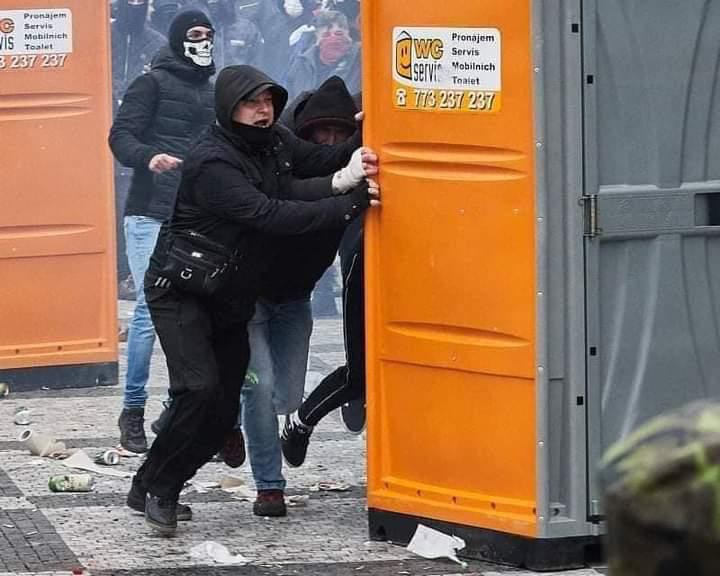
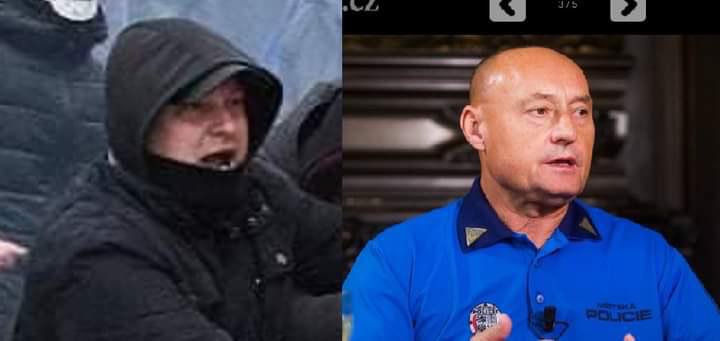
Were you worried that there would be violence at the demonstration?
I was afraid that something like this would happen, which is why I met with the leaders of the fans before this. I was aware there would be an escalation of conflict and I did whatever I could to prevent it and as far I was aware the leaders of the fans were doing the same.
On one hand, I was afraid there would violence but on the other, I think that no matter whether you are a football fan you still have a right to express your opinion
From your point of view, why would the government or police want it to end in violence?
The government wouldn’t want to have the demonstration to be only a space for people to share their reasonable opinion. But as a result f the demonstration there should be a message that the police force attacked us. as you can see right now, people are talking about this in terms of escalation of the violence not talking about the message of the demonstration.
People may be facing criminal charges as a result of the violence of the demonstration that you spoke at. If somebody was sent to jail on these charges, would you help them in any way?
I don’t know anything about the charges. We want to press charges against the minister for not allowing the demonstration, which is against the constitution and the right to protest.
I spoke with the leaders of the football fan clubs and I didn’t know there were any criminal charges pressed. From what I know, anybody who was arrested was taken to the police station at Prague 8 and then released.
The headman of Sparta called me and his involvement with the situation was the same as mine, he said that some people took the opportunity to participate in the violence. There was a snowball effect. I don’t want to be associated with anybody who is violent against the police. I am wondering what is going to happen at the next demonstration.
If there was anybody who came to the protest and used violence against the police they should face prosecution for their actions. On the other hand, if there is a court case the court should take into consideration that whatever violence took place, they were provoked by the police.
I met with the spokesperson of HON in a hotel to talk about my speech, but I don’t want to be associated with them beyond that.
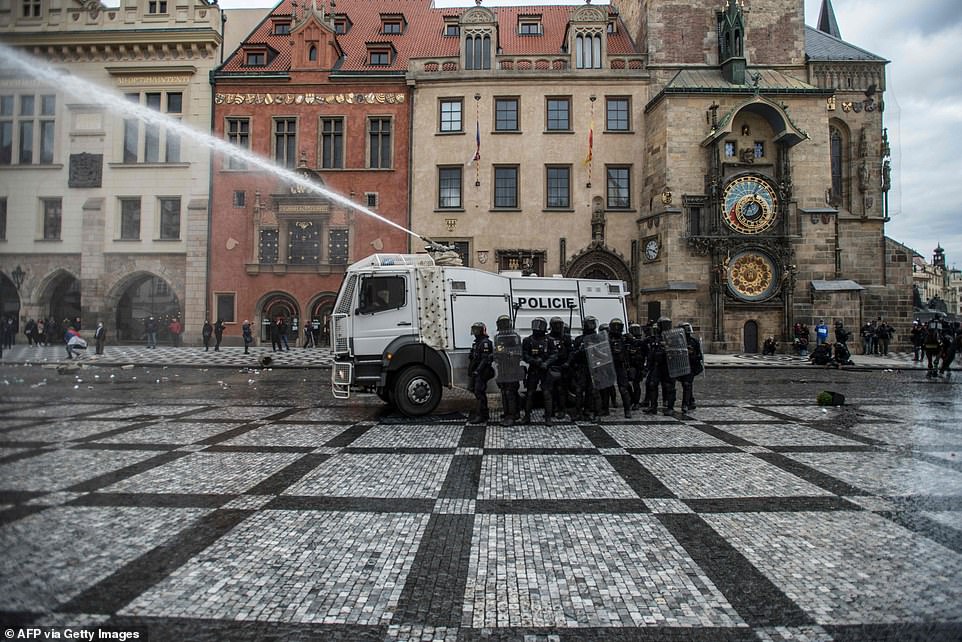
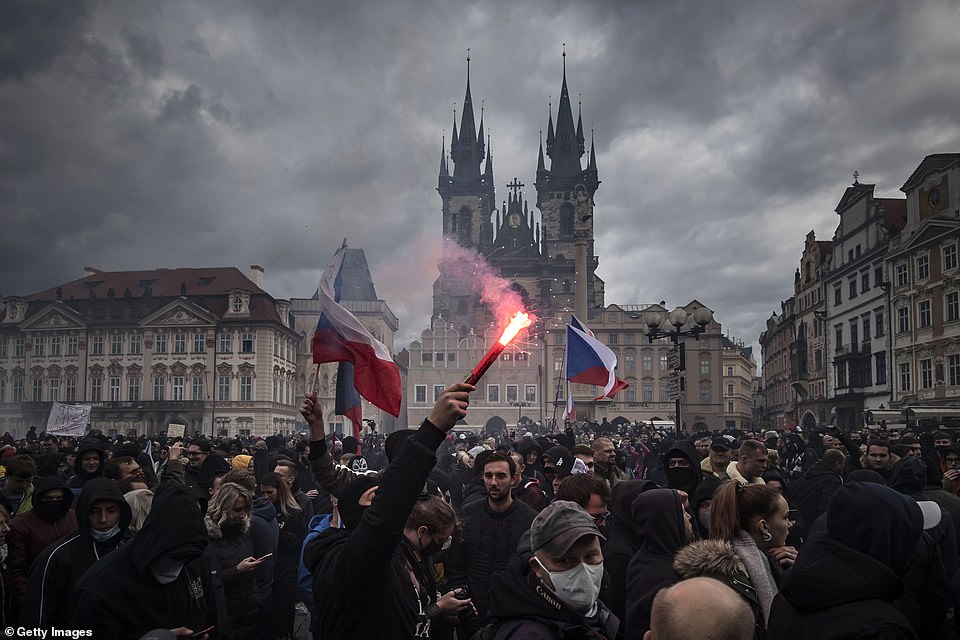
For the protest organised for the 28th of October, the organisers announced that the government does not want it to take place. Should people still attend or should they stay home?
I cannot tell people to go to the demonstrations if they are afraid of the virus or of the consequences but I will be going myself.
Has your experience at the demonstration changed how you view the situation?
I will go to other demonstrations but I don’t want to give all of my energy to this because I have a family which is the most important place for me.
Because of the violence provoked by police, everybody who went to protest is portrayed as violent and aggressive. Unfortunately, that was the effect that those in power wanted to achieve, and the outcome I was most afraid of.
Charles University’s maths department is on the lookout for graphic designs to create the visuals for their new beer. Submit a design and you could win money and a keg of Ferdinand’s beer.
The beer will be called Nice Number, to honour the mathematical constant for calculating the circumference of a circle, pi (π).
The university’s Faculty of Mathematics and Physics, is developing the beer in partnership with the Research Institute of Brewing and Malting and the traditional Czech brewery, Ferdinand.
A spokesman explained: “The beer recipe is inspired by the number π. For example, because good beer leaves rings on the glass, or because beer meets discussion rings.”
The unique beer will kick off a long line of Spring 2021 releases for Ferdinand.
Martin Vlach, vice-dean of the Charles University IFF for promotion, explains that Pi “is also symbolically reflected in its recipe.”
Pi in its numerical form begins as 3.14. To match this, π is being produced with three types of hops, its gradation is around 14 and the alcohol content is about 6.28 per cent, which refers to π times two.
The drink is brewed according to the recipe of the Research Institute of Brewing and Malting Brewery Ferdinand under the name Pěkný číslo.
The Faculty of Mathematics and Physics is now calling for Graphic Designers to submit their design for the beer label and other visual elements. The winner of the competition will receive a Ferdinand beer keg (50 l) and CZK 12,000.
